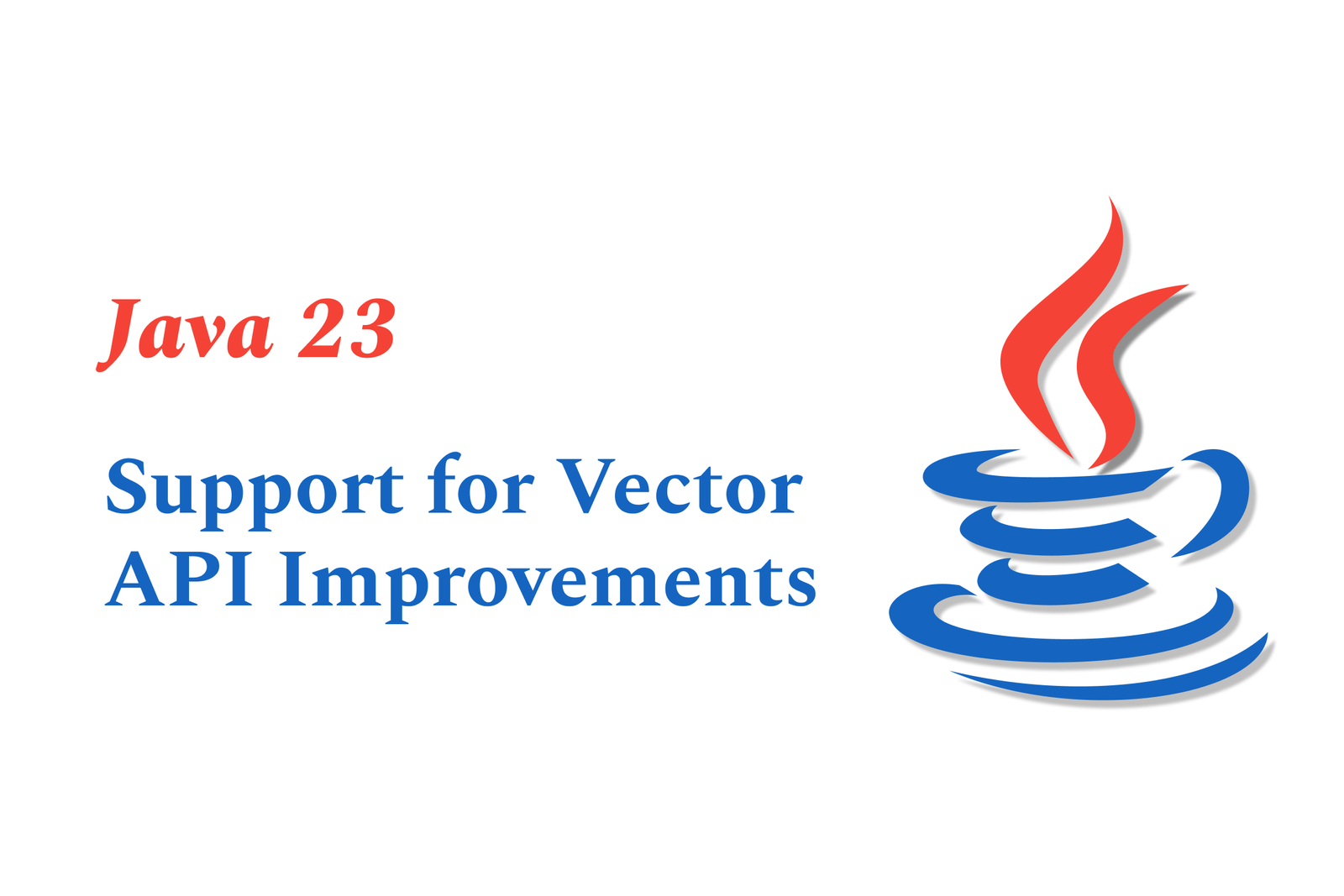Java 23 support for vector API improvements
Java 23 introduces the eighth incubation of the Vector API, enhancing runtime-optimized, platform-agnostic vector computations for improved performance. Open Liberty’s beta support enables developers to test these advanced, efficient vector operations in modern Java applications.
Java 23 Support for Vector API Improvements
1 ) Introduction to Java 23 Support in Open Liberty
The Open Liberty 24.0.0.10 beta release introduces beta support for Java SE 23.
It allows developers to test Java 23's new features and enhancements using Open Liberty.
This beta release also handles incompatible SameSite=None cookie clients to prevent cookie rejection or mishandling.
2 ) Key Features in Java 23
Java 23 is the latest Java release as of September 2024, bringing several new features but is not a Long Term Support (LTS) version.
Notable Java Enhancement Proposals (JEPs) in Java 23 include:
JEP 469: Vector API (Eighth Incubator) improved vector computations for performance.
Other JEPs covering primitive pattern types, class file APIs, markdown documentation comments, structured concurrency, scoped values, and more.
3 ) Using Java 23 with Open Liberty
Steps to get started include:
Downloading Java 23.
Installing Open Liberty 24.0.0.10 beta.
Configuring JAVA_HOME to point to Java 23.
This early adoption allows extended testing and adaptation of applications and microservices.
4 ) Improvements to SameSite Cookie Handling
The new version improves handling of SameSite=None cookies by identifying incompatible client User Agent versions.
If a client is incompatible, Open Liberty removes SameSite=None and Partitioned headers from cookies to prevent rejection or misbehavior.
This prevents breaks in user sessions due to cookie mismanagement across client versions.
5 ) Detailed Enhancements for the Vector API (JEP 469 )
The Vector API allows runtime compilation of vector computations optimized for supported CPU architectures (x64 and ARM AArch64 ).
The API aims to be clear, concise, platform agnostic, and performant.
It supports graceful fallback when vector instructions are not fully supported on hardware.
The API is incubating in Java 23 to eventually integrate with Project Valhalla's value types for improved performance and usability.
Emphasis is on reliable runtime compilation, performance, and cross platform portability without specific CPU instruction set dependencies.
6 ) Performance Enhancements in JDK 24 Related to Vector and Foreign Function & Memory API
Although primarily about JDK 24, improvements build on the foundation of Java 23 features.
JDK 24 introduces performance boosts in bulk memory operations (fill, copy, mismatch) for smaller memory segments by avoiding costly native transitions.
These optimizations contribute indirectly to better performance when using vectorized operations or memory segments in Java applications.
Summary:
Open Liberty now supports Java 23 with its latest beta, enabling early access to new Java features including improved vector computing capabilities via the eighth incubator of the Vector API. Additionally, it enhances web security by smartly managing SameSite cookie compatibility. The Java 23 Vector API focuses on clear, portable, and efficient vectorized computations compiled at runtime to harness underlying CPU architectures. These improvements pave the way for better performance and developer experience, complemented by ongoing performance boosts in JDK 24.
https://justacademy.in/news-detail/android-sdk-tool-updates
https://justacademy.in/news-detail/react-native?s-new-features-that-will-make-you-switch
https://justacademy.in/news-detail/top-android-smartphones-launched-in-2025
https://justacademy.in/news-detail/kotlin-vs-java:-the-ongoing-battle-in-android-development
https://justacademy.in/news-detail/swiftui-charts-framework:-what?s-new-in-2025
Related Posts
In 2025, top Angular libraries offer modern, feature-rich components and tools for building dynamic web apps. From powerful data grids to low-code platforms like UI Bakery, these libraries enhance development speed, UI design, and scalability, making them essential for Angular developers.
Migrating from AngularJS to Angular 17 involves gradually upgrading your app by running both frameworks together using tools like ngUpgrade, rewriting components in TypeScript, and adopting Angular’s modern architecture to enhance performance, maintainability, and long-term support.
Angular state management tools help organize and handle app data efficiently, improving scalability and maintainability. Popular options include NgRx for robust, RxJS-based patterns, and newer Signal Store solutions that offer simpler, reactive approaches integrated tightly with Angular’s latest features.
RxJS in Angular empowers developers to manage asynchronous data streams with powerful operators like `forkJoin`, `combineLatest`, and `zip`. Mastering these key operators in 2025 is essential for building efficient, reactive applications that handle complex event sequences seamlessly.
Angular performance optimization in 2025 focuses on improving app speed and responsiveness by using techniques like OnPush change detection, lazy loading, efficient data caching, and AOT compilation. These practices reduce load times, enhance user experience, and ensure scalable, fast Angular applications.
In 2025, Angular remains preferred for large-scale, enterprise apps with its robust, all-in-one framework, while Vue attracts developers seeking simplicity and fast development for smaller projects. Both frameworks excel, with choice driven by project needs and team expertise.
Angular Signals are a new reactive primitive in Angular 16 that enable fine-grained, efficient change detection by automatically tracking dependencies and updating only affected parts of the UI. They simplify state management and boost app performance, revolutionizing Angular's reactivity model.
Angular interview questions to prepare in 2025 focus on core concepts like components, directives, data binding, routing, and dependency injection, along with TypeScript mastery and latest Angular features to ensure strong practical knowledge for building scalable, efficient web applications.
AngularJS reached its official end of support in January 2022, meaning no further updates or security patches. To ensure app security and performance, developers should consider migrating to modern Angular versions or seek third-party long-term support options if immediate migration isn’t possible.
The Angular Roadmap 2025 highlights upcoming features focused on improving developer experience and performance, including zoneless Angular, Signals integration, enhanced Forms, async data handling, improved HMR, and expanded Angular Material/CDK enhancements, driving modern, efficient web app development.










